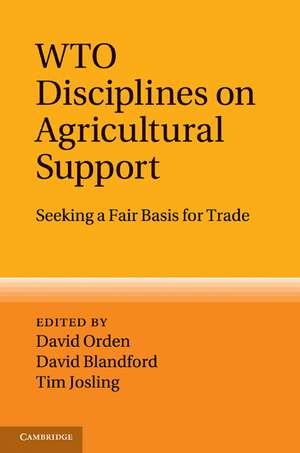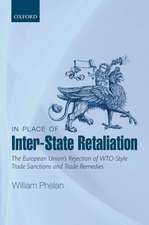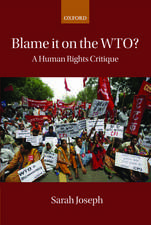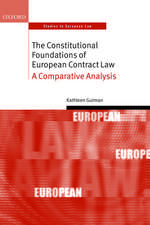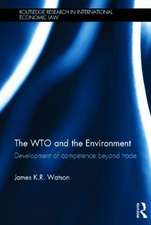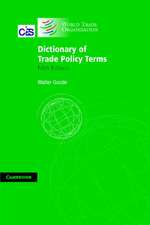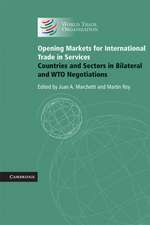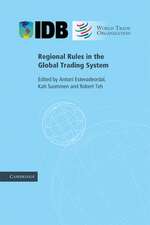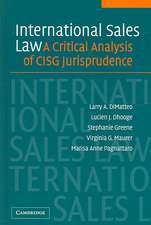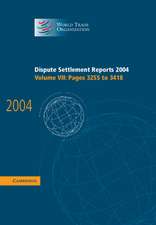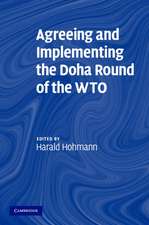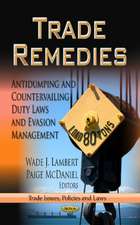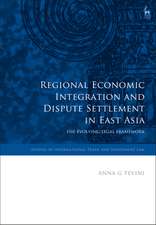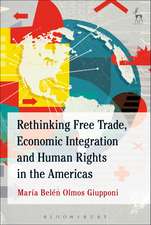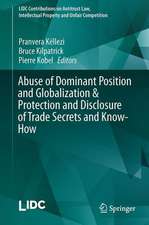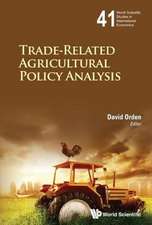WTO Disciplines on Agricultural Support: Seeking a Fair Basis for Trade
Editat de David Orden, David Blandford, Tim Joslingen Limba Engleză Hardback – 30 mar 2011
| Toate formatele și edițiile | Preț | Express |
|---|---|---|
| Paperback (1) | 448.37 lei 6-8 săpt. | |
| Cambridge University Press – 18 iun 2014 | 448.37 lei 6-8 săpt. | |
| Hardback (1) | 901.95 lei 6-8 săpt. | |
| Cambridge University Press – 30 mar 2011 | 901.95 lei 6-8 săpt. |
Preț: 901.95 lei
Preț vechi: 1048.78 lei
-14% Nou
Puncte Express: 1353
Preț estimativ în valută:
172.59€ • 180.65$ • 143.65£
172.59€ • 180.65$ • 143.65£
Carte tipărită la comandă
Livrare economică 31 martie-14 aprilie
Preluare comenzi: 021 569.72.76
Specificații
ISBN-13: 9781107005440
ISBN-10: 1107005442
Pagini: 520
Ilustrații: 35 b/w illus. 89 tables
Dimensiuni: 160 x 235 x 27 mm
Greutate: 0.94 kg
Editura: Cambridge University Press
Colecția Cambridge University Press
Locul publicării:New York, United States
ISBN-10: 1107005442
Pagini: 520
Ilustrații: 35 b/w illus. 89 tables
Dimensiuni: 160 x 235 x 27 mm
Greutate: 0.94 kg
Editura: Cambridge University Press
Colecția Cambridge University Press
Locul publicării:New York, United States
Cuprins
Part I. Overview of Domestic Support Issues and WTO Rules: 1. Introduction David Orden, David Blandford and Tim Josling; 2. The WTO disciplines on domestic support Lars Brink; Part II. Developed Countries: Have High Levels of Support Come Down?: 3. European Union Tim Josling and Alan Swinbank; 4. United States David Blandford and David Orden; 5. Japan Yoshihisa Godo and Daisuke Takahashi; 6. Norway Ivar Gaasland, Roberto Garcia and Erling Vardal; Part III. Developing Countries: Will Low Levels of Support Rise?: 7. Brazil Andre Nassar; 8. India Munisamy Gopinath; 9. China Fuzhi Cheng; 10. Philippines Caesar B. Cororaton; Part IV. Looking Forward: Can Fair Markets Be Achieved?: 11. The difficult task of disciplining domestic support David Orden, David Blandford and Tim Josling; Appendix A. Domestic support provisions of the Agreement on Agriculture; Appendix B. Domestic support provisions of the Doha draft modalities.
Recenzii
'We now need to build on the achievements of the Uruguay Round by completing the long overdue Doha Development Agenda. The authors of this study include experts who have played a leading role in the design of these disciplines. It is a formidable contribution to a subject of global importance.' Honorable Tim Groser, New Zealand Trade Minister and former Chair of the Doha Agriculture Negotiations
'This book deserves great praise. It answers almost all the pertinent questions raised in the international context of domestic support and is a clear reference for negotiators, experts, researchers, lawyers, politicians and other readers.' Franz Fischler, former Commissioner for Agriculture, European Union
'This excellent book provides a bright torch with which to examine existing and proposed disciplines. It is essential reading for those who wish to understand the domestic support issues in the current round of negotiations.' Joseph W. Glauber, Chief Economist, US Department of Agriculture and former US Special Doha Agricultural Envoy
'Finally a group of authors has had the courage and stamina to provide us with a systematic analysis of how major countries deal with the WTO disciplines on farm support. No longer do we need to rely on fragmentary information. This is a book for which we have waited eagerly.' Stefan Tangermann, former OECD Director for Trade and Agriculture
'The country-specific analysis allows academics and practitioners to get the real picture behind the notifications. Policymakers around the world now have an informed choice between undoing the Uruguay Round accomplishments and progressive self-reform based on international trade rules.' Christian Häberli, former Chair of the WTO Committee on Agriculture
'An excellent contribution to the literature on agricultural policy and trade and a remarkable input to encourage and promote the WTO agricultural negotiations to agreement.' Masayoshi Honma, University of Tokyo
'Governments, non-governmental organisations, researchers and journalists need measures to compare the levels and types of support to agriculture across countries. All these … should find this book extremely useful, and I wholeheartedly recommend it to colleagues and students.' Luca Salvatici, European Review of Agricultural Economics
'At its core, this book makes a compelling argument for the value of transparency … By reading this book, students, researchers, and policy practitioners will gain a deeper appreciation of the role of transparency and will be more sophisticated consumers of WTO notified information in the future.' World Trade Review
'This book deserves great praise. It answers almost all the pertinent questions raised in the international context of domestic support and is a clear reference for negotiators, experts, researchers, lawyers, politicians and other readers.' Franz Fischler, former Commissioner for Agriculture, European Union
'This excellent book provides a bright torch with which to examine existing and proposed disciplines. It is essential reading for those who wish to understand the domestic support issues in the current round of negotiations.' Joseph W. Glauber, Chief Economist, US Department of Agriculture and former US Special Doha Agricultural Envoy
'Finally a group of authors has had the courage and stamina to provide us with a systematic analysis of how major countries deal with the WTO disciplines on farm support. No longer do we need to rely on fragmentary information. This is a book for which we have waited eagerly.' Stefan Tangermann, former OECD Director for Trade and Agriculture
'The country-specific analysis allows academics and practitioners to get the real picture behind the notifications. Policymakers around the world now have an informed choice between undoing the Uruguay Round accomplishments and progressive self-reform based on international trade rules.' Christian Häberli, former Chair of the WTO Committee on Agriculture
'An excellent contribution to the literature on agricultural policy and trade and a remarkable input to encourage and promote the WTO agricultural negotiations to agreement.' Masayoshi Honma, University of Tokyo
'Governments, non-governmental organisations, researchers and journalists need measures to compare the levels and types of support to agriculture across countries. All these … should find this book extremely useful, and I wholeheartedly recommend it to colleagues and students.' Luca Salvatici, European Review of Agricultural Economics
'At its core, this book makes a compelling argument for the value of transparency … By reading this book, students, researchers, and policy practitioners will gain a deeper appreciation of the role of transparency and will be more sophisticated consumers of WTO notified information in the future.' World Trade Review
Descriere
Developed and key developing countries heavily support their farmers. Can the WTO reduce the worldwide harm these unilateral policies cause?
